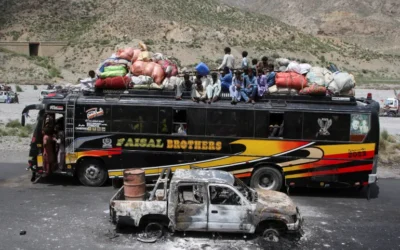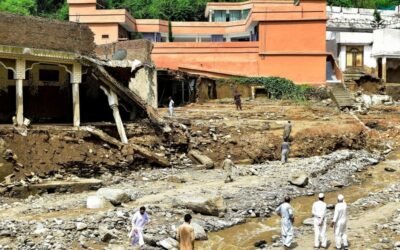Rhetoric of Cooperation vs. Reality on the Ground
When Western capitals talk about climate leadership they often use phrases like “shared responsibility” and “global partnership.” But for many countries in the Global South, including Pakistan, the reality looks different: a continuing pattern in which rich countries set the rules, control the money, and shape solutions that fit their interests. This is not always deliberate bad faith, it is frequently structural. What passes for cooperation can, in practice, reproduce the very inequalities that made climate risks worse for poorer nations in the first place.
The Finance Pledge That Fell Short
At the heart of the grievance is finance. Developed countries pledged more than a decade ago to mobilise $100 billion a year to help developing countries with mitigation and adaptation. That pledge became a political cornerstone of North–South climate trust. While OECD accounting shows that the $100 billion goal was materially surpassed in 2022, the way finance is counted and delivered has repeatedly frayed trust. Much of the money reported as “climate finance” is private capital mobilised through guarantees or loans, not direct public grants; this shifts the burden onto borrowing countries and can deepen debt pressures. The result is a gap between rhetoric and what vulnerable countries actually receive and can use.
You May Like to Read: Climate Change as an Economic Crisis
The Loss, and Damage Debate
Loss and damage is the clearest test of this tension. Nations already suffering irreversible harm from floods, heatwaves and sea-level rise demanded a dedicated fund; after protracted negotiations a Fund for Responding to Loss and Damage was formalised at UN climate talks and decisions were taken to operationalise it. That was a breakthrough: recognition that climate impacts are not simply future risks but present economic and non-economic losses that require public solidarity.
Yet pledges to capitalise the fund have been slow and patchy. While a number of Western countries made initial commitments, subsequent momentum stalled and the fund’s operational needs remain underfunded. For countries on the front line, Pakistan among them, slow and conditional support feels less like relief and more like a reaffirmation of unequal bargaining power.
Market Solutions, and Structural Bias
There are several mechanisms through which inequality is reproduced. First, much Western climate assistance prioritises market-based solutions and private-sector mobilisation. Markets have a role, but they rarely prioritise the poorest communities or pay for rebuilding rice fields, mud houses or traditional fisheries. Second, Western-led technical assistance can come with strings: consultants, technologies and procurement channels that favour firms in donor countries.
Third, governance rules for multilateral funds and development banks often require co-financing or creditworthiness, conditions that exclude fragile states or force them into loans rather than grants. These structural features mean that the form of “help” often mirrors existing global economic patterns rather than upending them.
You May Like to Read: Climate Diplomacy at a Crossroads: Beyond Emission Targets
Politics of Burden-Sharing
The politics behind these structures is real. Many Western governments face domestic constraints, like fiscal pressures, competing priorities and political scepticism about foreign aid. Rather than acknowledging that historical emissions and accumulated wealth create obligations, policymakers increasingly push for “shared” responsibility that broadens who pays and how, including asking developing countries to mobilise private money or to shoulder parts of adaptation costs.
This framing shifts moral language into technocratic terms and lets high-emitting countries avoid systemic changes in finance, trade or carbon-intensive industries. The result is policy that looks like cooperation on paper but preserves old hierarchies in practice.
Civil Society Pushback
Civil society voices have noticed and pushed back. At recent global financing and development forums, hundreds of civil society organisations warned that deliberations were becoming too centred on private finance and that poorer countries were losing influence over decisions that affect their futures. Frustration stems not only from under-delivery of funds but from a sense of shrinking space to set the agenda. Without stronger democratic channels into global climate governance, decisions will keep reflecting donor preferences more than recipient needs.
Pakistan’s Vulnerable Position
For Pakistan, the stakes are immediate. Repeated floods, heatwaves and glacial melt have created huge reconstruction needs, eroded livelihoods and increased food insecurity. The country must navigate international finance rules to access grants and concessional finance, while also pressing for fairer burden-sharing at the UN climate process.
That means pursuing immediate wins, faster, unconditional access to loss-and-damage financing, more grants rather than loans, technical support aligned with local priorities, and long-term reform; pushing for transparent accounting of climate finance, for public financing modalities that do not saddle vulnerable countries with debt, and for a global system that recognises historical responsibility. Evidence-based diplomacy will matter, but so will coalition-building with other affected countries to rebalance negotiating power.
Concluding
The West is not a monolith, and many policy-makers and activists there genuinely want equitable outcomes. Still, until climate diplomacy confronts structural inequality rather than dressing it in cooperative language, trust will be limited and the world will struggle to marshal the funds and political courage needed for a fair transition. For Pakistan and similar countries, the task is to demand clarity, demand grant-based support for loss and damage, and insist that “global cooperation” means changing the rules, not only counting on better intentions. Only then can climate diplomacy stop masking inequality and start delivering real protection for those who need it most.




























